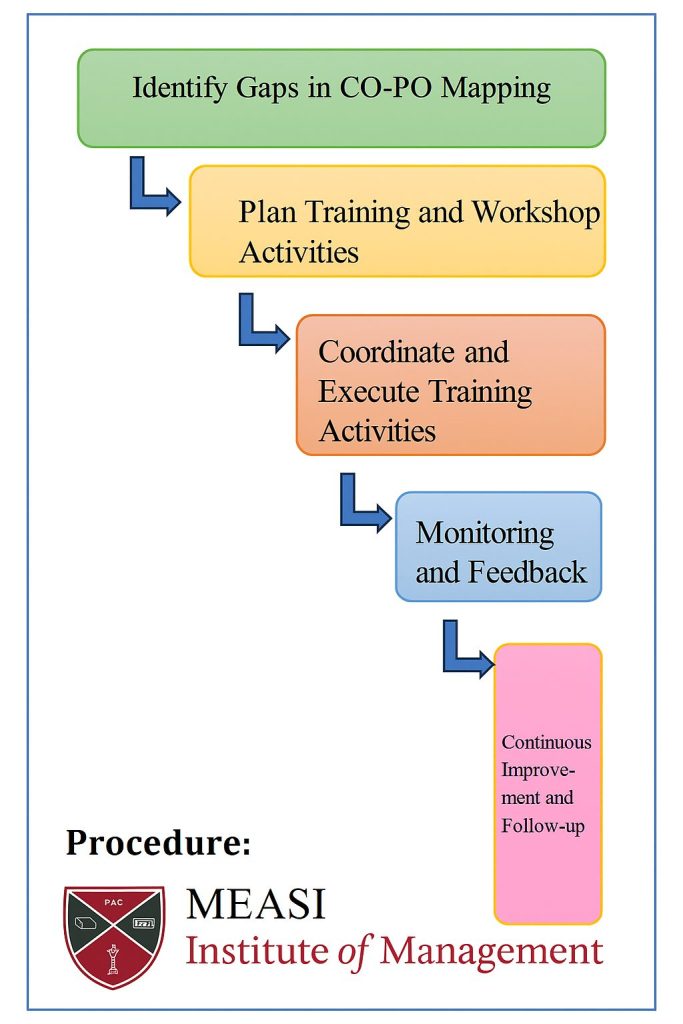SOP for Faculty Training & Workshop
Standard Operating Procedure (SOP) for Faculty Training & Workshop
Purpose
Objective
- To identify and address gaps in CO-PO mapping based on curriculum gaps.
- To empower faculty with the necessary skills, industry knowledge, and pedagogical tools to bridge identified gaps.
- To ensure faculty can effectively deliver content that meets program outcomes, enhances student learning, and aligns with industry requirements.
Scope
Roles and Responsibilities
- Identifies curriculum gaps through CO-PO mapping and faculty feedback.
- Coordinates with department heads and external experts to plan suitable training/workshops.
- Monitors and evaluates the effectiveness of each training/workshop program.
- Assists in identifying relevant training topics and resources.
- Provides recommendations for industry collaborations and online resources.
- Reviews and approves proposed training plans.
- Actively participate in training, workshops, and professional development programs.
- Implement learned skills in classroom teaching and curriculum delivery.
- Provide feedback for further improvements in training programs.
Procedure

Step 1: Identify Gaps in CO-PO Mapping
- Conduct a CO-PO mapping analysis to assess curriculum gaps and identify areas requiring additional faculty competency.
- Gather faculty feedback to understand the challenges they face in meeting specific COs.
- Document identified gaps, categorize them by theme (e.g., industry knowledge, technical skills, teaching methods), and prioritize based on their impact on student learning.
Step 2: Plan Training and Workshop Activities
Based on the identified gaps, design a comprehensive training plan that includes:
- Workshops on specific subjects or teaching methodologies.
- Industry-Institute Interactions (e.g., guest lectures, field visits) to connect faculty with industry trends and expectations.
- Online Courses and certifications to enhance technical skills or pedagogical methods.
- Socially Relevant Projects that engage faculty with real-world applications of curriculum content.
- Publication Initiatives such as technical magazines and newsletters to foster research and knowledge sharing.
- Prepare an annual calendar of training and development activities, ensuring a balanced distribution of sessions throughout the academic year.
Step 3: Coordinate and Execute Training Activities
- Workshop Preparation: Arrange resources, schedule venues, and confirm guest speakers or industry experts.
- Faculty Notification: Inform faculty members of the schedule, objectives, and expected outcomes of each training session.
- Attendance and Participation: Track faculty attendance and engagement in each activity, encouraging active participation.
- Learning Resources: Provide materials, resources, and post-workshop assignments to reinforce learning.
Step 4: Monitoring and Feedback
After each session, gather feedback from participating faculty to assess the relevance, effectiveness, and potential improvements.
- Evaluate the impact of training on teaching effectiveness and CO attainment through classroom observations and student feedback.
- Monitor the implementation of learned skills by reviewing course materials, teaching approaches, and any contributions to curriculum improvements.
Step 5: Continuous Improvement and Follow-up
Based on feedback and performance evaluations, modify training programs to address emerging needs and further curriculum gaps.
- Document best practices and successful activities in a Faculty Development Report for continuous improvement.
- Reassess CO-PO mapping annually to measure the effectiveness of training efforts and update training needs.
Expected Outcomes
- Improved CO-PO alignment in curriculum delivery and attainment.
- Enhanced faculty competence in both content knowledge and teaching methodologies.
- Increased collaboration with industry and community for relevant curriculum development.
- Ongoing faculty engagement in professional development activities to stay updated with academic and industry trends.
Documentation
2. Attendance Records: Documentation of faculty participation.
3. Evaluation Reports: Feedback, learning outcomes, and impact assessment reports for each session.
4. Faculty Development Report: A comprehensive annual report summarizing training activities, feedback, outcomes, and improvement areas.
Approval and Review
- This SOP will be reviewed annually by the Faculty Development Committee to incorporate any updates or changes in training requirements.
- All modifications to this SOP will require approval from the Academic Coordinator and the Institute’s Director.
Effective Date:
Review Date:
This SOP is designed to foster a culture of continuous learning and improvement among faculty, ensuring that MEASI Institute of Management maintains high educational standards and stays aligned with industry and societal needs.

